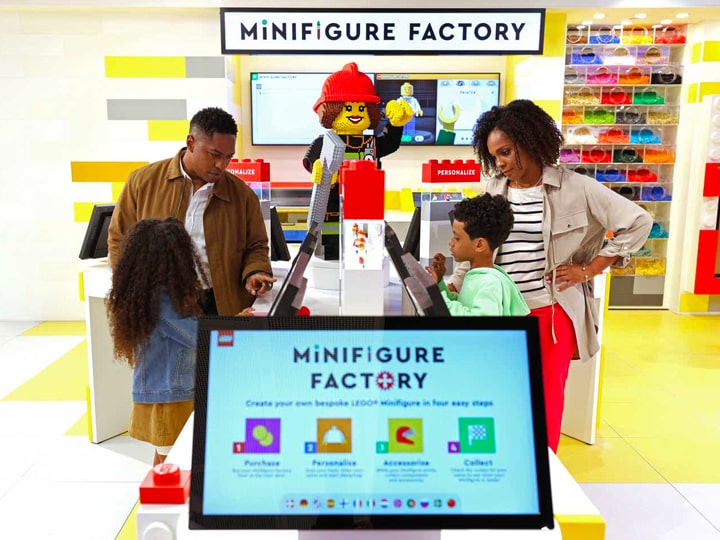As Higher Education Institutions (HEIs), we are tasked by governments to train the employees of the future – but what does the future of work look like and what skills will students need?
As an HEI, we are developing the future HE curricula to ensure that graduates leave with the employability skills of the future. We demonstrate this with an example: developing the future retail leaders with the most needed skills. To do this, first we need to look into the recent developments in retailing.
What is driving change?
Over the last few years and accelerated by the pandemic, technological innovations have become a key driver of progress. For example, we have seen technology become integral to retail delivery in cases such as Just Walk Out Technologies from Amazon and Lego New York with their retailtainment focussed layout and Harrods integrated app, with store walking guide. These innovations are driven not just by the development of technology but by the creative mindset that enables such innovation.


A second key trend is that of sustainability. Over the last 20 years, it is possible to observe that retail has undergone a transformation with many retailers now ensuring that sustainability is an integral part of their operations, such as John Lewis’ and Waitrose’s commitment to ethical trading and people within supply chains and M&S’ Plan A. Furthermore, both OECD’s 2030 framework and UNESCO’s Education for Sustainable Development Plan 2030, identify that future leaders, should focus on an absolutely responsible and sustainable business approach.
While some of these developments are exciting, the others are becoming an immediate urgency, but often HEIs are slow to offer any meaningful solutions as they are still focussed on providing pedagogic approaches that are not dramatically different from the 1960s. Simultaneously, as the pandemic has spurred on retail change, it has also sped up educational change. Suddenly as educators, we had to deliver lectures via zoom and offer students digital experiential learning opportunities, whilst caring for their wellbeing.
Given such seismic changes in teaching as we emerge from the pandemic, we need to make sure that we continue to reflect the world of work, mirror these changes in teaching practice and offer digitally enriched student experiences that are realistic and meeting the changing needs of the world.
What future employability skills do students need?
Considering such large-scale changes in the workplace, we need to consider exactly what skills students need. The skills that students need can be divided into three categories.
Firstly, the human skills of the future, for example, the recent ISE (2021) survey identified that students need increased experiential learning opportunities to develop their much-needed critical thinking skills while feeling uncomfortable and challenged for learning to happen. Artificial Intelligence (AI) is aiming at low skilled tasks and future jobs will seek people with skills in mainly creativity and critical thinking. Creativity, particularly, has a high currency as innovation directly contributes to organisational value and success. The benefits of creativity, which is a ‘human skill’ and cannot be easily digitalised, in solving complex individual, social, and global issues are becoming the focus of today’s job market. Additional human skills include complex problem solving, cognitive flexibility and emotional intelligence.
Secondly, students must graduate with their digital literacy and citizenship developed. Importantly, society needs graduates not with just technical skills but with the ability to utilise digital skills in finding, evaluating, using and creating content to support business objectives. The OECD recognises this challenge in their “The OECD Learning Compass 2030” and identifies the necessary future skills.
Thirdly, we need graduates who understand the challenges around sustainability and who can offer entrepreneurial and innovative solutions.
As HEI’s can we deliver such skills?
The answer is ‘YES’. One way to enable students to gain future work skills is to use experiential learning (EL) which replicates tasks and standards required for the world of work. Here at the University of Birmingham using EL, we created an authentic retail assessment that enables students to develop their human, digital and sustainable skills. This technique allows students to learn in an enjoyable way while EL integrates the retail experience needs through embedding the ‘experience’ into the curriculum. This assignment incorporates store design, creativity, imagination, digital, video editing and teamwork experiences across different time zones. This via EL challenges participants in many ways by asking them to navigate in unknown environments, go outside the conceptual frameworks and remove hierarchical class-room etiquettes.
At the University of Birmingham, our focus is shaped by the business practice and using creative pedagogical innovations that aim to prepare our students for their future. Authenticity helps students understand the complexity of work, contextualise their skills and allows developing new work-ready skills: design thinking and creative solution development. Importantly, students now have their retail digital portfolios to embed in their CVs, that helps them to stand out in a competitive graduate marketplace. Through this experience, students become more articulate regarding their future careers and become aware of exciting career opportunities.
It is therefore critical that as HEI’s we adapt our offer to students and give them the opportunity to engage in digital EL to develop the required skills and knowledge, to be the success of the future, drive sector change and be ready for the fourth industrial revolution.
Discover more about the education opportunities available at the University of Birmingham Dubai